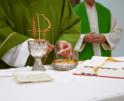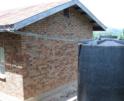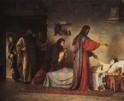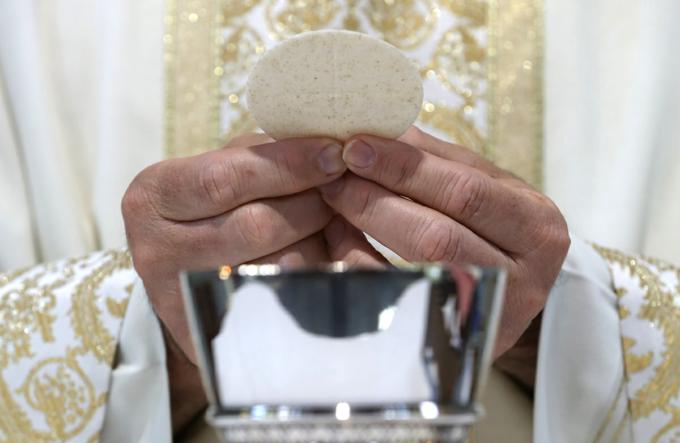
Faith
All of the Eucharistic Prayers we presently have for Mass have some common elements. They all have a similar structure. Even with their variety, you can see this.
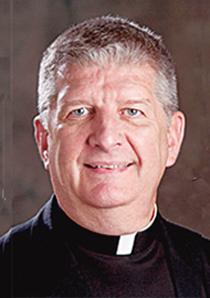
O'Grady
During the coming weeks, we'll be looking at individual Eucharistic Prayers that are in the present Roman Missal. Prior to doing that, and so seeing the variety of them available to priests and people, we'll look at what is similar or common to them -- similar, not the same.
The variety consists in the Eucharistic Prayers customarily designated with Roman numerals I, II, III, and IV; Prayer I is also the Roman Canon. There is another one with the long title "Eucharistic Prayer for Various Needs and Occasions," often abbreviated VNO. This one is interesting because it has four forms, thus yielding four Eucharistic Prayers. There are two for reconciliation and three for Masses with children, though these latter three are not in the current edition of the Roman Missal but are in a separate booklet. More on all of these as we meet them in coming weeks.
Similar or common
All of the Eucharistic Prayers we presently have for Mass have some common elements. They all have a similar structure. Even with their variety, you can see this.
You'll recognize this both generally and when we look at each prayer.
Each one begins with the dialogue between the priest and the rest of the assembly.
Then there is a preface. This is the section that takes up the principal reason why we are at Mass: to give thanks to God the Father for the redemption accomplished by his Son in the Holy Spirit. But it also refers to splendid, varied ways for which we give thanks: a particular feast of the Lord, of his Mother, of the saints, in general, or for particular events in the life of the individual Catholic and the church (think sacraments, funerals, etc). There are more than 70 of these throughout the Missal, but most are gathered in one section before the Eucharistic Prayers.
We acclaim and join and assent to this with the Holy, Holy, Holy.
Next, there is a first invocation for the sending of the Holy Spirit to change the bread and wine into the Body and Blood of Christ. This can be longer or shorter depending on the prayer being prayed.
Then, come the narrative of the Last Supper and Words of Institution. These words from the Gospels, but with some editing, speak about what Jesus did at the Last Supper and employ his words. We are connected to that Last Super by this very mystery we are celebrating.
The assembly assents to this mystery with the Memorial Acclamation, of which there are three options.
The prayer continues with an invocation for the Holy Spirit to change us into what we will receive, that is to make us all the more the Body of Christ. Notice it's plural -- we and us.
Next, there are intercessions. These are prayers when we call on the Mother of the Lord and the saints to join us in this prayer. We also pray for the church, mentioning by name the pope and the bishop of our diocese, and the clergy in general, and then for all members of the church. There is always an intercession for the dead. This can be expanded when the Mass is offered for a particular deceased member of the faithful, mostly at a funeral Mass.
In some of the prayers, as we'll see, there are intercessions that may be added for the specific celebration. Usually, this is when the celebration of another sacrament happens within the Mass. Among these are intercessions for those baptized, confirmed, married, newly ordained bishops, presbyters or deacons, or those who have received the anointing of the sick.
These intercessions are a reminder to all of us praying that we are united with others in this prayer. Our unseen companions are the saints, who have arrived at their and our goal, and our beloved dead, who rely on our prayers as, after death, they continue their journey to that same goal. Our unseen companions are also members of the church, here and now. Naming the pope reminds us of the universality of the church. We are praying with Catholics from Alaska to Zaire, from Asia to Europe. Naming our bishop reminds us of the particular church, in our case, the Archdiocese of Boston. We are praying with Catholics from Ashland to Weymouth, Marshfield to Merrimack, as well as with all those present at this Mass with us.
Lastly is the Doxology. The prayer is concluded by these final words of praise.
The priest alone (or with concelebrants if there are any) chants (if possible) or says (if necessary): "Through him, and with him, and in him, O God, almighty Father, in the unity of the Holy Spirit, all glory and honor is yours, for ever and ever."
The assembly (though not the priest or priests) joins or consents with the Great Amen.
Recent articles in the Faith & Family section
-
Eucharistic Prayers for Reconciliation and for Masses with ChildrenFather Robert M. O'Grady
-
Mainstay of Seminarians in the Missions: The Society of St. Peter ApostleMaureen Crowley Heil
-
Arise!Scott Hahn
-
The opportunity of summer: Build and repair relationshipsDr. R. Jared Staudt
-
Why does the Catholic Church oppose contraception?Jenna Marie Cooper

